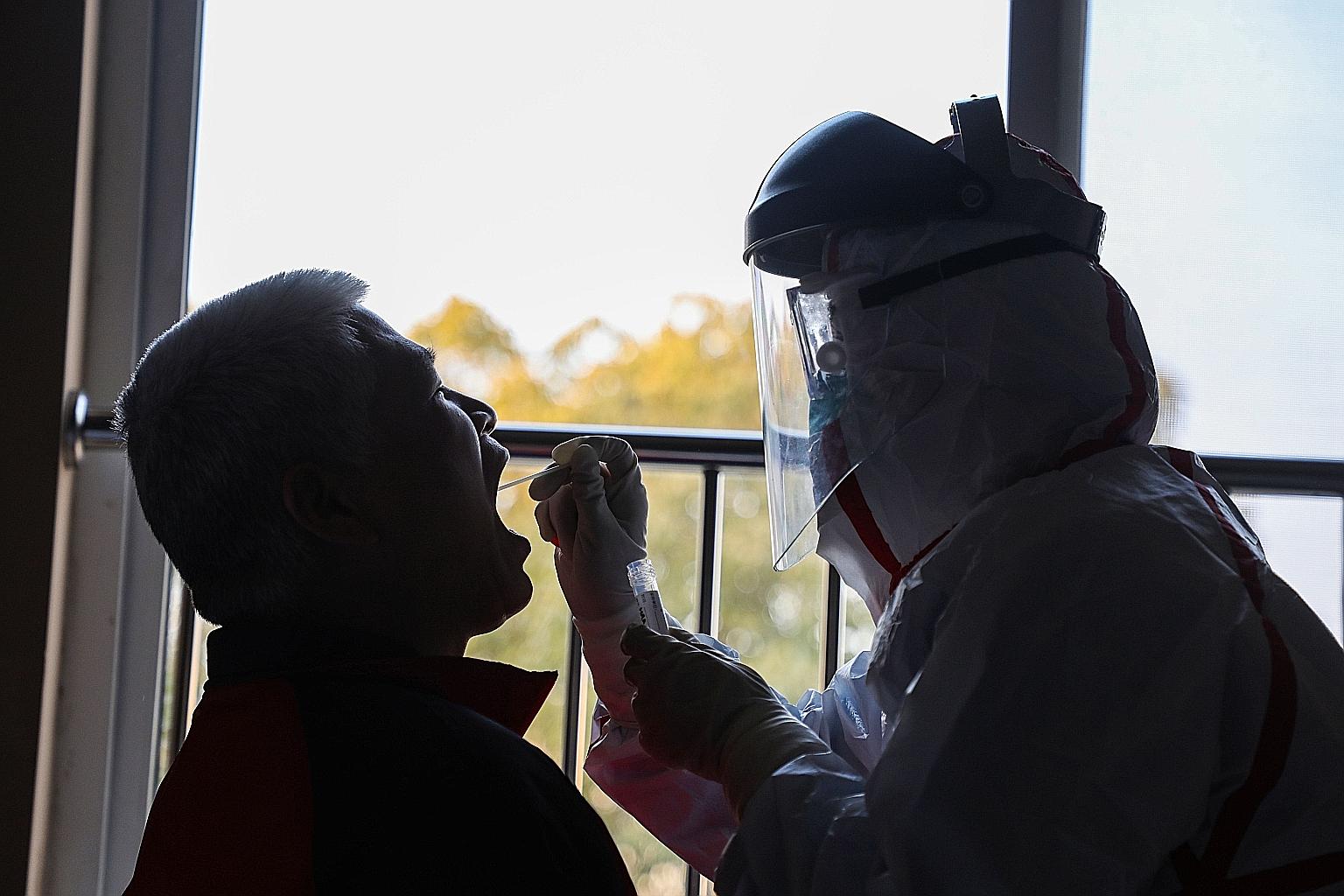Coronavirus outbreak: IMPACT WORLDWIDE
Chinese researchers apply for patent on experimental drug
Sign up now: Get insights on Asia's fast-moving developments

Samples being taken to be tested for the new coronavirus at a quarantine zone in Wuhan on Tuesday. Gilead said it has started clinical trials of patients in China using remdesivir.
PHOTO: AGENCE FRANCE-PRESSE
BEIJING • Chinese researchers have applied for a national patent on an experimental Gilead Sciences Inc drug that they believe might fight the coronavirus.
The Wuhan Institute of Virology - based in the Chinese city at the centre of the epidemic - has applied for a patent in China for the use of the anti-viral drug, known as remdesivir, in treating the virus.
The application was made on Jan 21 together with a military academy, according to a Feb 4 statement on the institute's website.
The move signals a desire to speed up development of one of the most promising potential treatments.
If the application succeeds, Gilead would need to get Chinese patent owners on board in sales of the drug for treating the virus infections outside China.
"The good thing in having a patent is that it would lead to cross-licensing situations that give China more bargaining chips in negotiating the licensing fee with Gilead," said Ms Wang Yanyu, a senior partner at AllBright Law Offices in Beijing.
The move to seek a patent instead of invoking the heavy-handed "compulsory licence" option that lets nations override drug patents in national emergencies, underscores the delicate balancing act before China as it signals commitment towards intellectual property rights alongside curbing the virus outbreak.
The patent filing will need to prove that the drug works on this coronavirus strain, 2019-nCoV, in a way that is different from its effect on other viruses in the same category.
Filing of the patent application by a stakeholder in China makes sense, said Ms Wang. "Most of the patients are here, rather than in the US, which makes it unlikely that Gilead will do all these tests," she explained.
Chinese scientists have found Gilead's remdesivir, and chloroquine, an 80-year-old malaria drug, highly effective in laboratory studies at thwarting the virus, they said on Tuesday in a paper in the journal Cell Research.
Gilead said it has started clinical trials of patients in China using remdesivir, but stressed that this work is investigational at this stage.
"It is not approved anywhere globally," a Gilead spokesman told Reuters in Beijing.
Gilead said it had increased manufacturing of remdesivir to create a stockpile that might be used in future viral disease outbreaks.
Gilead will retain the global rights to market the antiviral medication - once the patent is granted - in treating illnesses such as Ebola and severe acute respiratory syndrome, for which the drug was originally intended.
Separately, China's Changjiang Daily, the official newspaper of the city of Wuhan, reported on Tuesday that a team of researchers led by Zhejiang University's Professor Li Lanjuan has found that the drugs abidol and darunavir can inhibit the virus in in vitro cell experiments.
In Britain, Sky News reported that a British scientist has made a significant breakthrough in the race for a vaccine by reducing part of the normal development time from two to three years to only 14 days. A vaccine will be too late for the current virus, but the breakthrough will be crucial if there is another outbreak, Sky said.
However, the World Health Organisation (WHO) played down the media reports, saying that there are "no known effective therapeutics" against the virus.
Asked about the reports, WHO spokesman Tarik Jasarevic said: "There are no known effective therapeutics against this 2019-nCoV (virus), and the WHO recommends enrolment into a randomised controlled trial to test efficacy and safety."
The process of developing and testing drugs or vaccines against a new pathogen normally takes many years and is often fraught with pitfalls and failures.
BLOOMBERG, REUTERS


